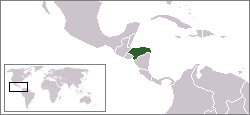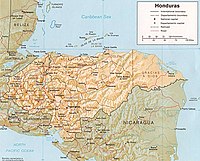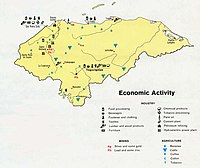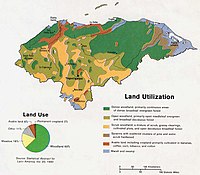Honduras
From Wikipedia, the free encyclopedia.
The Republic of Honduras is an independent country in western Central America, bordered to the west by Guatemala, to the south west El Salvador, to the south east by Nicaragua, to the south by the Pacific Ocean, to the north by the Gulf of Honduras and the Caribbean Sea. Belize (formerly "British Honduras") is 75 km away across the Gulf of Honduras.
|
|||||
| National motto: none1 | |||||
 |
|||||
| Official language | Spanish | ||||
| Capital | Tegucigalpa | ||||
| Capital's coordinates | 14°6′ N 87°13′ W | ||||
| President | Ricardo Maduro | ||||
| Area - Total |
Ranked 101st 112,090 km² |
||||
| Population - Total (2000) |
96th 6,975,204 |
||||
| Independence - Declared |
(from Spain) |
||||
| Currency | Lempira | ||||
| Time zone | UTC -6 | ||||
| National anthem | 'Tu bandera es un lampo de cielo' | ||||
| Internet TLD | .hn | ||||
| Calling Code | 504 | ||||
| 1 Although Honduras has no official motto, "NO PASARÁN" or "They shall not pass" became popular during the 1969 war with El Salvador. This is an allusion to the El Salvador's stated goal to reach the Honduran Caribbean coast during their offensive. | |||||
Contents |
History
Main articles: History of Honduras, Timeline of Honduran history
The Pre-Columbian city of Copán is a locale in extreme western Honduras, in the Copán Department, near to the Guatemalan border. It is the site of a major Maya kingdom of the Classic era. The ancient kingdom, named Xukpi (Corner-Bundle), flourished from the 5th century AD to the early 9th century, with antecedents going back to at least the 2nd century AD. The Maya civilization decayed, and by the time the Spanish came to Honduras, the once great city-state of Copán was overrun by the jungle.
After the Spanish discovery and subsequent conquest, Honduras became part of Spain's vast empire in the New World. The Spanish ruled Honduras for approximately 3 centuries.
Honduras became a state in the United Provinces of Central America in 1821, and an independent republic with the demise of the union in 1840.
The Football war of 1969 was fought with El Salvador. It lasted approximately 100 days. During the 1980s, Honduras was used by anti-Sandinista contras fighting the Nicaraguan government and an ally to El Salvadoran government forces fighting against leftist guerrillas.
Hurricane Fifi which caused severe damage took place around on September 18 and 19, 1974. Later, Hurricane Mitch devastated the country and wrecked its economy in 1998.
Politics
Main article:Politics of Honduras See also: Elections in Honduras President of Honduras
A Presidential and general election is scheduled for November 27, 2005. Honduras has five registered political parties: National Party of Honduras (Partido Nacional de Honduras:PNH), Liberal Party of Honduras (Partido Liberal de Honduras:PLH), Social Democrats (Partido Innovación Nacional y Social Demócrata:PINU-SD), Social Christians (Partido Demócrata-Cristiano:DC), and Democrat Unification (Partido Unificación Democrática-UD). The PNH and PLH have ruled the country for decades. In the last 23 years, Honduras has had four Liberal presidents: Roberto Suazo Córdova, José Azcona del Hoyo, Carlos Roberto Reina, and Carlos Roberto Flores, and two Nationalists: Rafael Leonardo Callejas Romero and Ricardo Maduro. The elections have been full of controversies including, questions about whether Azcona was born in Honduras or Spain, and whether Maduro should have been able to stand givenm he was born in Panama.
Roberto Suazo Cordoba ruled the country during the so called "Lost Decade" when hundreds of human rights violations were committed, and alleged political crimes were common place. In 1986, Azcona del Hoyo was elected via the "Formula B," when Azcona did not obtain the majority of votes. However, 5 Liberal candidates and 4 Nationalist were running for president at that time, and the "Formula B" required all votes from all candidates from the same party to be added together. Azcona then became the president. In 1990, Callejas won the election under the slogan "Llegó el momento del Cambio," (The time for Change is here), which was heavily criticized for resembling El Salvador's "ARENAs" political campaign. Callejas Romero gained a reputation for illicit enrichment. Callejas has been the subject of several scandals and accusations in the last two decades. In 1998, during Flores Facusse's mandate, Hurricane Mitch hit the country and all indications of economic growth were washed out in a period of 5 days.
In 2004 separate ballots were used for mayors, congress, and president. Many more candidates were registered for 2005's election.
The Nationalist and Liberal parties are distinct political parties with their own dedicated band of supporters, but some have pointed out that their interests and policy measures throughout the 23 years of uninterrupted democracy have been very similar. They are often seen as primarily serving the interests of their own members, who receive jobs when their party gains power and lose them again when the other party does so. Both are seen as suppoertive of the elite who owns most of the wealth in the country, with neither of them promoting socialist ideals, even though in many ways Honduras is run like a democratic version of an old socialist state, with price controls and nationalized electric and land-line telephone services. armando
Subdivisions
Main articles: Departments of Honduras and Municipalities of Honduras
Honduras is divided into 18 departments and 298 municipalities. The largest department by surface area is Olancho department and by population is Francisco Morazán department and the smallest by both surface area and population is the Islas de la Bahía department.
Geography
Main article: Geography of Honduras
Honduras borders the Caribbean Sea on the north coast and the Pacific Ocean on the south through the Gulf of Fonseca. The climate varies from tropical in the lowlands to temperate in the mountains. The central and southern regions are relatively hotter and less humid than the northern coast.
Honduran terrain consists mainly of mountains (~80%), but there are narrow plains along the coasts, a large undeveloped lowland jungle La Mosquitia region in the northeast and the heavily populated lowland San Pedro Sula valley in the northwest. In La Mosquiti lies the UNESCO-protected Biosphere of Río Plátano, with the Río Negro dividing the country from Nicaragua. See Rivers of Honduras.
Natural resources include timber, gold, silver, copper, lead, zinc, iron ore, antimony, coal, fish, and hydropower.
Economy
Main article: Economy of Honduras
Honduras is one of the poorest countries in the Americas, with GDP per capita at US$2050 per year (1999). Under the presidency of Ricardo Maduro the economy has continued to grow slowly but the distribution of wealth remains very polarized with average wages remaining very low. Economic growth is roughly 5% a year, but many people remain below the poverty line. it is estimated that there are more than 1.2 million people who are unemployed.
The World Bank and the International Monetary Fund classified Honduras as one of the Heavily Indebted Poor Countries eligible for debt relief, and this debt relief was given in 2005..
Both the electricity services (ENEE) and land line telephone services (Hondutel) are run by government monopolies, with the former receiving heavy subsidies from the government because of its chronic financial problems. There are price controls around the price of petrol, and other temporary price controls of basic commodities are often passed for short periods by the Congress.
After years of declining against the US dollar the Lempira has stabilized at around 19 Lempiras per dollar.
Demographics
Main article: Demographics of Honduras
The population of Honduras is predominantly of Mestizo descent and Roman Catholic faith, but there are also several Evangelical denominations. Along the northern coast are communities of English speakers who have maintained their culture since Honduras was part of the British Empire. Groups of Garífuna live along the north coast, where there are also many Afro-Latin Americans. In the 20th century, Garífunas became part of Honduras' projected identity through theatrical presentations such as Louvavagu in order to help boost tourism. Asians in Honduras are mostly of Chinese and Japanese descent. Hundreds of families can find their roots in Lebanon or Palestine, in Middle Eastern families called "turcos". The so-called "Turcos" along with the Jewish minority population dominate the Honduran economy and politics by having the highest income. Many others have connections to Spain, the United States (especially New Orleans, Florida and California) and the Cayman Islands. Even with all the "new-comers" in the country, the indigenous peoples of Honduras are widely scattered throughout the country. Tribes like Chortís (Mayan descent), Payas or Pech, Tolupanes or Xicaques/Jicaques, Lencas, Sumos or Tawahkas, and Olmecas. For the most part, these tribes live in extreme poverty due to their remote locations and uninterested government.
Culture
Main article: Culture of Honduras
The patron saint of Honduras is the Virgin of Suyapa.
A Honduran can be called a Catracho or Catracha. The word is derived from the last name of Honduran General Florencio Xatruch, who led Honduran armed forces in defense of Honduran territories in 1857 against an attempted invasion led by North American filibuster William Walker. The nickname is considered complimentary, not derogatory.
One of Honduras' best known writers is Ramón Amaya Amador. Other writers include Roberto Sosa, Eduardo Bähr, Amanda Castro, Javier Abril Espinoza, and Roberto Quesada.
Oscar Andres Rodriguez is a Cardinal who was a potential candidate for Pope in the Papal conclave, 2005.
Not as famous as the cardinal, but also noteworthy, is Salvador Moncada, a world-renowned scientist with authorship of more than 12 highly cited papers, including his work on nitric oxide. His research on heart-related drugs includes the development of Viagra. Moncada works at the University College of London and funds an NGO in Tegucigalpa.
Honduras This Week is a weekly English language newspaper that has been published now for 17 years in Tegucigalpa.
The Federación Nacional Autónoma de Fútbol de Honduras runs the popular Football league while the Honduras national football team represents the country internationally.
Environment
The Mesoamerican region, the landmass that extends from Southern Mexico to Panama, known for its diversity of species, is often called a "biodiversity hotspot". Similar to other countries in the region, Honduras contains diverse biological resources as well as indigenous cultures. For instance, it is believed that approximately 6,000-8,000 species of vascular plants are distributed across the country. The number of reptiles and amphibians species recorded so far is around 245; birds can be between 650-700 species, and mammal species are close to 110.
In the northeastern region of La Mosquitia lies the Río Plátano Biosphere Reserve, a lowland rainforest which provides home to a great diversity of life. Sometimes called "The Last Lungs of Central America", this Reserve was added to the UNESCO World Heritage Sites List in 1982.
Miscellaneous topics
- Communications in Honduras
- Elections in Honduras
- Garífunas
- Garifuna music
- Foreign relations of Honduras
- Flag of Honduras
- Liberalism in Honduras
- List of Honduras-related topics
- List of political parties in Honduras
- Mara Salvatrucha
- Military of Honduras
- Music of Honduras
- Project Honduras
- Transportation in Honduras
Note: Some of these articles are based on text from the CIA World Factbook 2000 and the U.S. Department of State website.
Further Reading
- Adventures in Nature: Honduras James D. Gollin
- Don't Be Afraid, Gringo: A Honduran Woman Speaks From The Heart : The Story of Elvia Alvarado Medea Benjamin
- Honduras: The Making of a Banana Republic Alison Acker
- Honduras: State for Sale Richard Lapper, James Painter
- Inside Honduras Kent Norsworthy and Tom Berry
- La Mosquitia: A Guide to the Savannas, Rain Forest and Turtle Hunters Derek Parent
- Moon Handbooks: Honduras Christopher Humphrey
- Reinterpreting the Banana Republic: Region and State in Honduras, 1870-1972 Dario A. Euraque
- Seven Names for the Bellbird: Conservation Geography in Honduras Mark Bonta
- Ulysses Travel Guide: Honduras Eric Hamovitch
- The United States in Honduras, 1980-1981: An Ambassador's Memoir Jack R. Binns
- The War of the Dispossessed: Honduras and El Salvador, 1969 Thomas P. Anderson
| Countries in Central America |
|---|
| Belize | Costa Rica | El Salvador | Guatemala | Honduras | Nicaragua | Panama |







